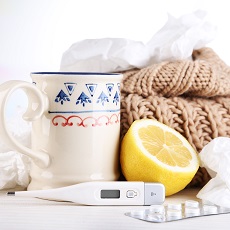Cold and Cough Medicines

Learn More
See, Play and Learn
- No links available
Research
Resources
Summary
Sneezing, sore throat, a stuffy nose, coughing -- everyone knows the symptoms of the common cold. It is probably the most common illness. Every year, adults get about 2-3 colds, and children get even more.
What can you do for your cold or cough symptoms? Besides drinking lots of fluids and getting plenty of rest, you may decide to take medicines. There are lots of different cold and cough medicines, and they do different things.
- Nasal decongestants - unclog a stuffy nose
- Cough suppressants - quiet a cough
- Expectorants - loosen mucus so you can cough it up
- Antihistamines - stop runny noses and sneezing
- Pain relievers - ease fever, headaches, and minor aches and pains
Before taking these medicines, read the labels carefully. Many cold and cough medicines contain the same active ingredients. For example, taking too much of certain pain relievers can lead to serious injury. Do not give cold or cough medicines to children under four, and don't give aspirin to children. Finally, antibiotics won't help a cold.
Centers for Disease Control and Prevention
Treatments and Therapies
-
Time To Talk About Natural Products for the Flu and Colds: What Does the Science Say?
 (National Center for Complementary and Integrative Health)
(National Center for Complementary and Integrative Health)
Related Issues
- Don't Double Up on Acetaminophen (Food and Drug Administration) Also in Spanish
- High Blood Pressure and Cold Remedies: Which Are Safe? (Mayo Foundation for Medical Education and Research) Also in Spanish
Specifics
-
Echinacea
 (National Center for Complementary and Integrative Health)
(National Center for Complementary and Integrative Health)
- Echinacea: What Should I Know about It? (American Academy of Family Physicians) Also in Spanish
- Zinc for Colds: The Final Word? (Mayo Foundation for Medical Education and Research) Also in Spanish
Clinical Trials
-
ClinicalTrials.gov: Antitussive Agents
 (National Institutes of Health)
(National Institutes of Health)
-
ClinicalTrials.gov: Histamine Antagonists
 (National Institutes of Health)
(National Institutes of Health)
Journal Articles References and abstracts from MEDLINE/PubMed (National Library of Medicine)
Find an Expert
Children
- Cough and Cold Medicine Abuse (For Parents) (Nemours Foundation) Also in Spanish
- Coughs and Colds: Medicines or Home Remedies? (American Academy of Pediatrics) Also in Spanish
- Daily Medicine Record for Your Child (Food and Drug Administration)
Teenagers
- Cough & Cold Medicine Abuse (Nemours Foundation) Also in Spanish
-
Cough and Cold Medicine (DXM and Codeine Syrup)
 (National Institute on Drug Abuse)
Also in Spanish
(National Institute on Drug Abuse)
Also in Spanish
